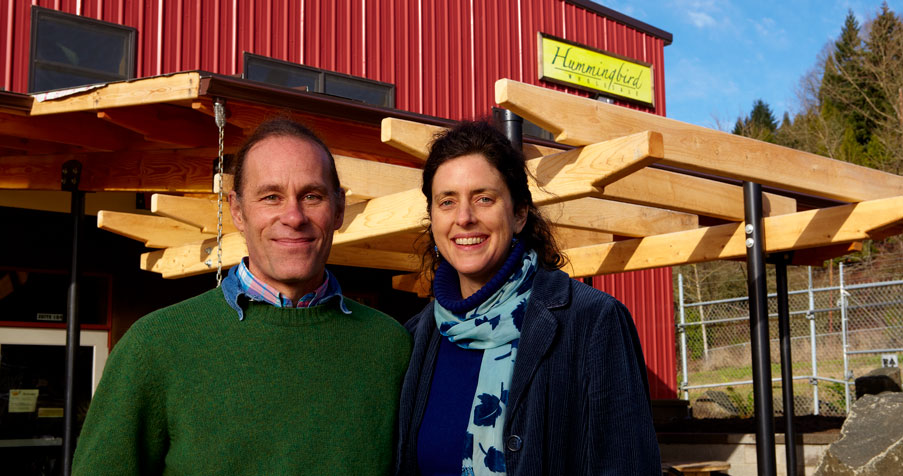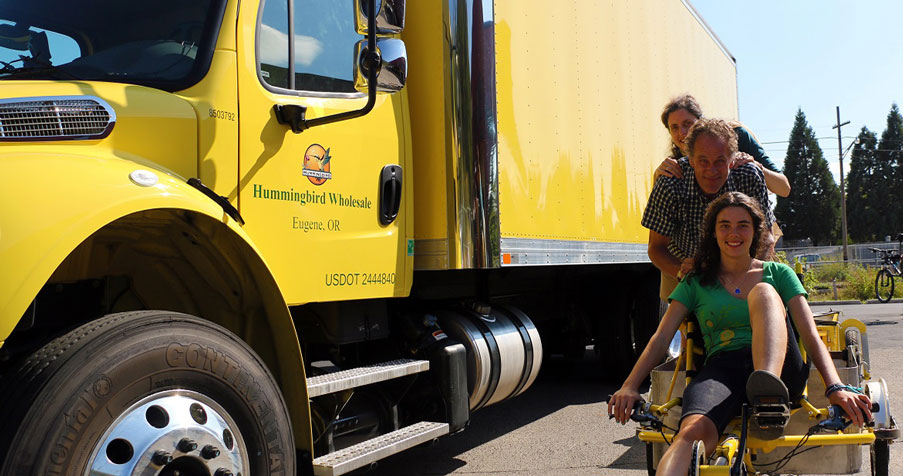Hummingbird puts farmers first in transforming a region’s food system
Jan 11 2018
Tom Hunton, a third-generation Oregon farmer, was visiting a local school when he received an unexpected thank-you gift: a bag of muffins baked by fourth-graders. Accompanying the baked goods was a note that said, “Thank you, Mr. Hunton, for making the food that we eat every day.”
The muffins were made from organic wheat Hunton had grown and ground in his stone mill—wheat that his distributor, Hummingbird Wholesale, had delivered to the school district.
“There were tears in Tom’s eyes as he read it,” says Charlie Tilt, co-owner of Eugene, Oregon–based Hummingbird Wholesale, recalling the 2014 visit. “It was such a beautiful contrast to what happens when you sell your wheat to a multinational corporation.”
It’s also a perfect example of the interconnectedness that Tilt and his wife, co-owner Julie Tilt, cultivate at Hummingbird and in their efforts to transform the food system.
So far, they’ve encountered only success. When the Tilts bought the wholesale business in 2003, it focused on providing organic food to small health food stores and generated $300,000 in annual revenue. Hummingbird has since grown into a 46-employee operation with $14 million in annual revenue. The company now delivers a variety of products, including locally grown organic beans, legumes, grains, and flours, to customers from Bellingham, Washington, to San Francisco. Its 900 customers include independent health food stores, processors, buying clubs, restaurants, and schools. And Hummingbird has done all this while placing farmers first.

Charlie and Julie Tilt, co-owners of Hummingbird Wholesale.
“Charlie and Julie are the type of entrepreneurs we’re always looking to support,” says Meredith Storton, senior associate, RSF social enterprise lending. “They consider all the angles. They think about their farmers, their customers, their employees, the environment, and the community they live in.”
Finding purpose in changing a system and redefining social work
The Tilts had always wanted to make the world a better place. They just thought they’d be doing it as licensed social workers.
In 2003, Julie and Charlie were thinking about returning to school to get their social work degrees. To pay for grad school, they decided to buy Honey Heaven, a Eugene wholesaler where Charlie had worked part-time. The profits would pay their tuition, and they planned to sell the business after four years.
When they began to look more closely at Hummingbird’s offerings, though, they ran into difficulties. The only organic millet they could find, for example, was from China and of poor quality. The Tilts realized there was an urgent need for U.S.-grown organic beans, seeds, and grains and for keeping money in the regional economy. They knew they had to do something about it.
Charlie and Julie never did become social workers. “It seemed like we were accomplishing the goals we’d hoped to achieve as social workers by helping our culture be healthier,” says Charlie.
New models share risk, boost profits, create markets
The Tilts know that a healthier food culture begins with farms, and they’ve been instrumental in transforming their local agriculture by looking at how they can affect the entire system. For example, Oregon’s Willamette Valley—whose well-drained, loamy soil runs from Portland to Eugene—is renowned for cultivation of grass seed. When demand for grass dwindled in 2008 during the mortgage crisis, Charlie convinced a number of farmers to grow recession-proof organic grains, beans, and edible seeds instead.
Now the Tilts and their employees guide farmers through the transition to the Oregon Tilth organic certification process, which is more rigorous than USDA certification requirements. They also guarantee that Hummingbird will buy a certain amount of their harvest at organic-level prices. This support is critical for getting farmers through the transition, as it takes three years and yields are lower at first. Hummingbird also contracts with its farmers, guaranteeing it will buy a certain amount from the next season.
Charlie calls this way of sharing in the farmer’s risk “distributor-supported agriculture.” Hummingbird also often helps farmers with up-front costs, such as buying seeds or a combine. “When we share risk, it creates stability for farmers in the marketplace,” he says.
In 2016, the company contracted with 50 organic farms in Oregon, Washington, and California, managing more than 10,000 acres of land. Thirty percent of Hummingbird’s total sales in that year came from food grown and processed in Oregon.
The Tilts have set the audacious goal of converting Oregon to 100 percent organic farming by 2045. To speed that process along, Hummingbird and other partners recently helped Oregon State University fund its first organic extension service agent, which can give farmers advice about how to succeed with organic farming.
The company goes the extra mile in helping farmers make money by helping to develop new markets for organic products—for example, turning Oregon organic corn into polenta, which farmers can sell at a higher price than they can kernels. Hummingbird has also created an Incubator Kitchen at its facility to help small-scale producers get a start creating local, organic, and gluten-free foods.
Connecting farmers with consumers provides a critical link
The company keeps an eye on its carbon footprint, making local deliveries on electric cargo tricycles, which ferried 300,000 pounds of food to stores last year. For years, Hummingbird was limited by how much it could deliver on long hauls, particularly to California, because it relied on an outside freight company. When the opportunity arose to buy its own fuel-efficient freight truck that met California’s strict emissions requirements, Hummingbird approached RSF for help.
The Tilts wanted to work with RSF because they admired the organization for its social change philosophy and for supporting the Waldorf school their children attended. “I wanted to diversify my banking and learn what RSF could teach me,” says Charlie. “They have a take on money and relationships that’s different from that of any financial institution I’ve dealt with. And if I’m around people who see the world and its opportunities as bigger than I do, I get something from that.”

Big deliveries, small carbon footprint.
Equal parts savings and inspiration
The trucks have had an enormous impact on Hummingbird’s business—and on getting healthy food to more communities. When the company began making its own deliveries to California, it doubled the number of runs and increased its sales there by 50 percent. This has allowed Hummingbird to serve the state’s Lost Coast region in Humboldt and Mendocino counties, delivering to 13 stores along that route that had been poorly served in the past. With the latest truck, Hummingbird doubled its deliveries to Portland, Oregon, as well. To keep up the pace, the company hired 10 more employees.
Deliveries with the new trucks are now much more efficient. Hummingbird offers “freight for hire” delivery services to other food companies in Eugene, so its trucks are almost always full. And the trucks are able to back-haul, picking up products the company orders from the San Francisco Bay Area, Portland, and Washington state for the return trip. “Making effective use of that extra capacity has saved us a tremendous amount of money,” says Tilt.
The new trucks are only part of the benefit of the RSF relationship, though. “Inspiration’s probably just as important,” Tilt says. “The food industry is challenging, and sometimes it’s hard to maintain one’s sense of possibility. With RSF, I feel like we’re part of something bigger than ourselves.”